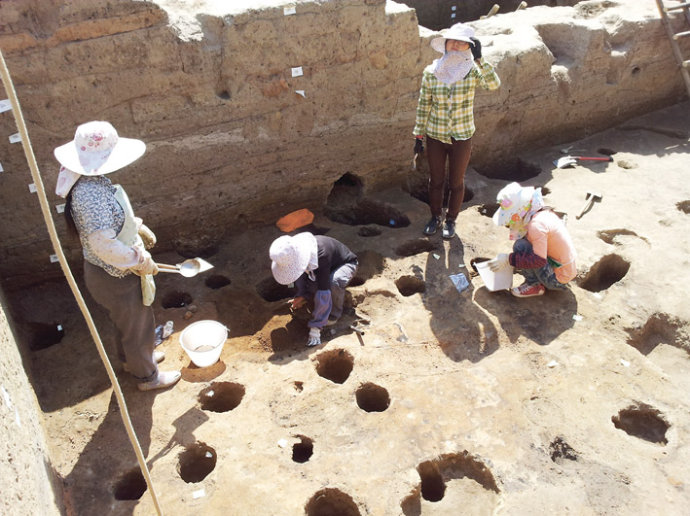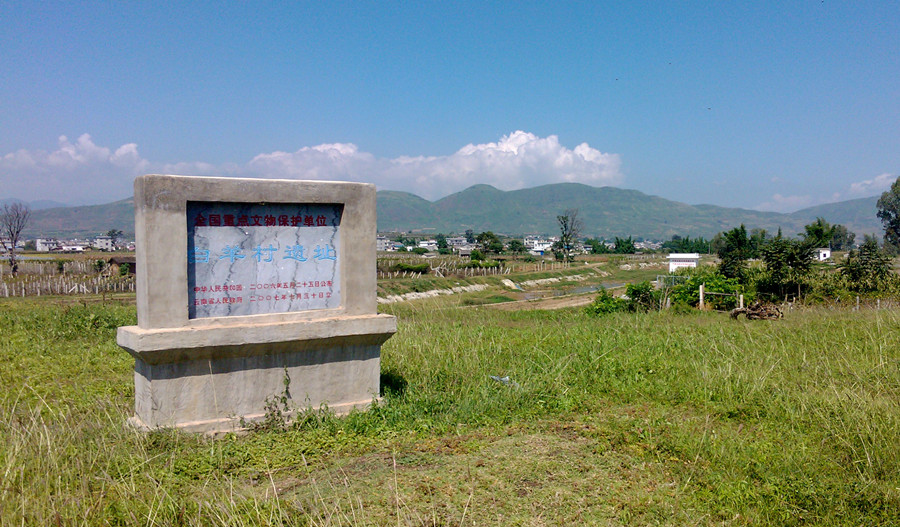Neolithic Site of Baiyang Village in Binchuan County, Dali
The Baiyangcun Site (白羊村遗址) is a significant Neolithic settlement located 500 meters west of Baiyang Village (白羊村), Jinniu Town (金牛镇), Binchuan County (宾川县), Dali Bai Autonomous Prefecture (大理白族自治州), Yunnan Province (云南省). It sits on a terrace beside a tributary of the Jinsha River (金沙江) and covers an area of about 3,000 m². Dating back around 4,500 years, the site reveals traces of ancient daily life, including houses, tombs, storage pits, and hearths.
Archaeological Discoveries
Excavations in 1973–1974 and 2013–2014 uncovered:
- Houses: Wooden structures with mud walls, some from early and late settlement phases.
- Tombs: 34 burials, including child jar burials.
- Artifacts: Over 500 stone, pottery, and bone tools; ornaments; and carbonized rice, showing early rice farming.
- Animal Remains: Bones from dogs, pigs, cattle, deer, and other species, revealing a mix of farming, hunting, and animal husbandry.
Historical Importance
The Baiyangcun Site offers valuable insights into Neolithic life in the upper Yangtze River region. It reflects a society transitioning from a matrilineal clan system to early patrilineal organization. The evidence of rice cultivation is especially important for studying the origins of agriculture in Yunnan.
Protection Status
- 1989: Listed as a county-level protected cultural site.
- 1998: Upgraded to a provincial-level key cultural relic site.
- 2006: Declared a National Key Cultural Relic Protection Unit by the State Council of the People’s Republic of China (中华人民共和国国务院).
Visiting Information
The site is located on a raised mound near the Sangyuan River (桑园河), about 500 meters from Baiyang Village. While the site itself is not a developed tourist park, it is of great interest to history and archaeology enthusiasts exploring Yunnan’s ancient past.

 7 Days GolfingTour
7 Days GolfingTour
 8 Days Group Tour
8 Days Group Tour
 8 Days Yunnan Tour
8 Days Yunnan Tour
 7 Days Shangri La Hiking
7 Days Shangri La Hiking
 11 Days Yunnan Tour
11 Days Yunnan Tour
 6 Days Yuanyang Terraces
6 Days Yuanyang Terraces
 11 Days Yunnan Tour
11 Days Yunnan Tour
 8 Days South Yunnan
8 Days South Yunnan
 7 Days Tea Tour
7 Days Tea Tour
 8 Days Muslim Tour
8 Days Muslim Tour
 12 Days Self-Driving
12 Days Self-Driving
 4 Days Haba Climbing
4 Days Haba Climbing
 Tiger Leaping Gorge
Tiger Leaping Gorge
 Stone Forest
Stone Forest
 Yunnan-Tibet
Yunnan-Tibet
 Hani Rice Terraces
Hani Rice Terraces
 Kunming
Kunming
 Lijiang
Lijiang
 Shangri-la
Shangri-la
 Dali
Dali
 XishuangBanna
XishuangBanna
 Honghe
Honghe
 Kunming
Kunming
 Lijiang
Lijiang
 Shangri-la
Shangri-la
 Yuanyang Rice Terraces
Yuanyang Rice Terraces
 Nujiang
Nujiang
 XishuangBanna
XishuangBanna
 Spring City Golf
Spring City Golf
 Snow Mountain Golf
Snow Mountain Golf
 Stone Mountain Golf
Stone Mountain Golf
















